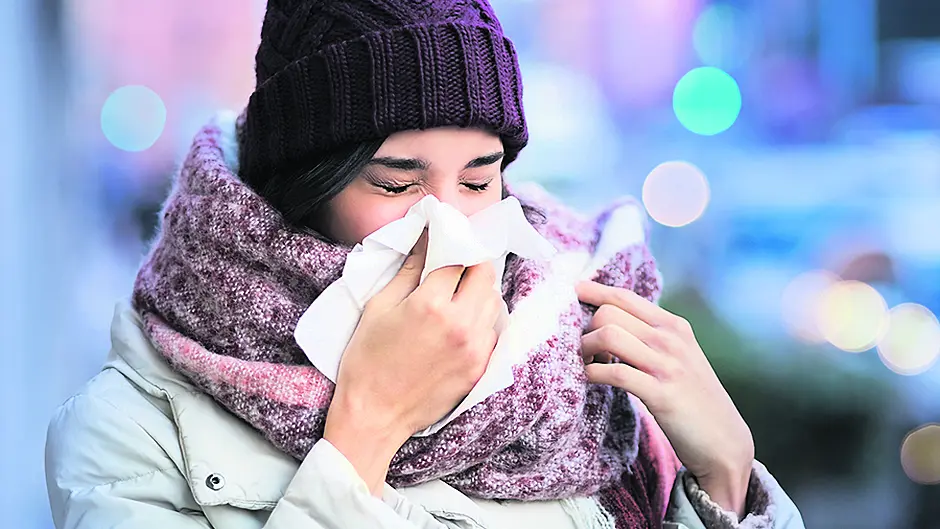While most of us can eventually brush off a viral infection, people with chronic health problems, the very young and the elderly are at serious risk of developing further complications like pneumonia
Health & Nutrition with Rosie Shelley
WHILE most of us can eventually brush off a viral infection, people with chronic health problems, the very young and the elderly are at serious risk of developing further complications like pneumonia.
It’s advised that anyone with the following should get their ‘flu jab now: heart disease, liver disease, diabetes, obesity, immune disorders, asthma, as well as pregnant women and those very young or over 65.
This is peak season for coming down with a cold or a ‘flu, for various reasons.; we know now that the genes that deal with infection are actually suppressed during the colder months (lack of the ‘sunshine vitamin’ D3 has just been shown to double the risk of death from infectious diseases), and that cold viruses have evolved to reproduce more efficiently when the body is chilled.
Central heating
If we’re cooped up inside with other people, there’s a greater chance of infection. The central heating and general lack of fresh air helps to incubate viruses, whilst the impact of switching between cold or wet and warm and dry environments can compromise the immune system. And stress can have a marked effect.
So the first steps involve finding ways to relax, and to get outside—combine the two with a daily stroll in winter sunshine.
Try wearing a scarf over your nose, the germ filtering organ, and layer your clothing so that you don’t get too hot or cold.
And research has shown that exercising a minimum of five times a week reduces the incidence of colds by a surprising 45%. Keep radiators at a comfortable setting, and try placing bowls of water around them to humidify the air.
Antiobiotics won’t work
Family doctors suggest that in the winter, a quarter of their patients are suffering from colds and ‘flu. But we’re doing ourselves no favours here—these are viruses, which won’t respond to antibiotics, and we know that the overuse of these drugs is contributing to the growing strength and prevalence of resistant diseases. If you have come down with a virus, stay at home, drink plenty of fluids, sleep and look after yourself.
Hand washing
Hand hygiene is key of course, as we know that 80% of viruses are spread by hand contact. Wash them regularly, simply with soap and hot water for around half a minute.
Antibacterial soaps have had mixed reviews, because overuse of any antibacterials may knock out your own natural defences. Have tissues within reach wherever you are.
If you’re stuck, sneezing into your inner elbow is much preferable to the instinct to sneeze into your hand. And it’s easier said than done, but try to steer clear of anyone who is sneezing or coughing. Some even advise this within the family, but in my experience you’re fighting a losing battle there; if your partner or your kids are infected, then you’ll have been exposed to their bacteria before you were aware of it. Building up your defences to begin with is more relevant.
How to protect yourself
Nutritionally, there are several safeguards you can choose for both preventing infections and limiting their duration. Nutrients such as vitamins C, D, E and betacarotene play a role in supporting the immune system, so include plenty of highly coloured fresh vegetables and fruit in your diet.
Concentrated levels of zinc, which has the same effect and will also shorten the course of colds and flu, can be found in lozenges and so on from the healthfood store, and good sources include seeds, poultry, red meat and wholegrains.
Omega 3s in oily fish help modulate the immune response and are anti-inflammatory. Specific foods that boost immunity and fight infection include garlic, onions, and warming spices such as ginger and chillies.
A significant proportion of the immune system resides in the gut, so building up levels of good bacteria is very helpful. Go for natural yoghurt, fermented products, wholegrains, pulses, Jerusalem artichokes, dandelion coffee, bananas, and those members of the onion family.
Taking a good probiotic has been shown to halve the risk of infection, and can even help double the chances of the ‘flu jab being effective.
Two tried and tested remedies, once you’ve succumbed, are chicken soup and hot honey and lemon drinks. The first has been proven to ease congestion and boost the immune system, by quite complex means, but the point is that human instinct is usually right, and it works.
But make sure it’s a homemade broth, rather than a creamy tinned version; dairy products aren’t generally a good idea when you’re mucousy.
The same homemade advice applies (because a fever is your friend and commercial preparations work to bring down a temperature) to hot lemon drinks that involve vitamin C and the antibacterial action of honey.
Although some of their benefits will be nullified by the heat, any warm drink is soothing and anti-inflammatory. And a spoonful of honey has been shown to be at least as effective at quelling coughs in the little ones as medicines.
Finally, Echinacea is well known when it comes to the prevention and control of viruses, but you really do get what you pay for as some strains are much more effective than others.
A personal favourite, especially for the children, is Sambucol. This elderberry extract is found in healthfood stores and can shrink a bout of the ‘flu to only three days.
BEST FOODS & SUPPLEMENTS:
Beetroot, berries, broccoli, chicken, chilli, cinnamon, citrus fruits, cocoa, eggs, garlic, ginger, horseradish, leafy greens, nuts, oily fish, onions and leeks, orange/yellow fruit and veg, peppers, seaweeds, seeds, tomatoes, turkey, turmeric, wholegrains, live yoghurt and all fermented foods such as sauerkraut, kimchi, kefir, sourdough bread.
Best Supplements:
Vitamin C with bioflavonoids, Vitamin D3, zinc, a good probiotic such as BioKult, Sambucol






